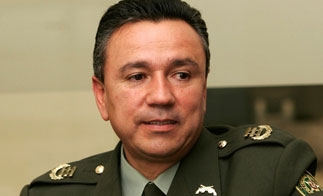Colombian General Mauricio Santoyo has turned himself in to US authorities, while a new report suggests that the general may have colluded with drug traffickers for over a decade, including during his time as Colombia’s national security chief.
On July 2, General Mauricio Santoyo flew from Bogota to Washington DC to face charges against him. The retired police general has been charged by the Virginia District Court for collaborating with drug traffickers and paramilitary groups.
Santoyo did not turn himself in immediately following the June 18 announcement of the charges, prompting Virginia judge T. Rawles Jones, Jr., to request the general’s arrest on June 26, reports Colombia’s El Tiempo.
Santoyo will remain in a detention center outside of the capital until he appears before Rawles sometime today. At that time, the retired general will be assigned a permanent detention center where he will remain during the trial, as he has been denied bail.
The accused general has declared himself innocent of all charges.
InSight Crime Analysis
The retired police general worked from 2002 to 2006 as the chief of security for then-President Alvaro Uribe. He is the first Colombian general to be extradited to the US.
Virginia state prosecutors have accused Santoyo of obtaining intelligence through illegal wiretaps, and then passing it on to the Oficina de Envigado crime syndicate to be used to assassinate competitors. They also allege that the general accepted bribes from paramilitary organization the United Self-Defense Forces of Colombia (AUC) to facilitate drug shipments to the US.
El Tiempo reports that Santoyo had previously been in contact with Drug Enforcement Administration (DEA) agents concerning rumors about his drug trafficking ties. According to the newspaper, Santoyo began meeting with agents in 2011. They met at least three times in Washington and Aruba to discuss accusations that former police officers and paramilitary members had made against him.
While the newspaper reports that the majority of the agents’ questions focused on the period after Santoyo’s work as commander of the anti-kidnapping task force in Medellin (1996-1999), the agents also questioned him about his time as a police attaché to the Colombian embassy in Italy (2008-2009).
The multiple meetings between DEA agents and Santoyo indicate that the investigation against him has been building for some time. Moreover, the widespread focus of the questions themselves suggests that a wider time frame is in question than just Santoyo’s period as security chief. Instead, Santoyo’s work as commander of an anti-terrorism task force from 2000 to 2002 up until his retirement as police attaché could be the basis of charges against him.

